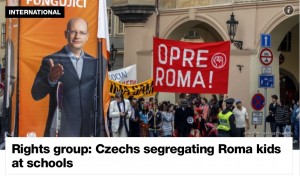Guggisberg (2014) reports on criminal Rroma clans that allegedly force children into crime. Parents surrender their children to an omnipotent clan chief – to whom they are indebted – for begging and theft and some even end up in prostitution. Guggisberg uncritically reproduces the perspective of the “Wiener Drehscheibe”, a social service for begging and stealing children who have been arrested by the police. Guggisberg does not question that the social educator Norbert Ceipek – the head of the institution – who identifies each begging or stealing child as a victim of human trafficking, could himself be subject to prejudices and be providing misinformation on Rroma: “Ceipek opens another photo file. It shows a Roma village in Romania, which he recently visited. He tells of houses, cobbled together from planks and plastic sheeting, and dirt roads full of garbage. In the middle is a magnificent villa. “It belongs to the clan chief. He rules the villages as a state within a state”, says Ceipek […]. Many of the children dealt with in Vienna belong to the Roma. […] “The phenomenon of Eastern European gangs of beggars is not new. But since a couple of months, it taken new proportions”, says Ceipek. Very active are the Bosnian gangs, he states. Every few weeks, they would bring the children to different European cities, according to a rotating system. The social worker explains that his aim was to provide a perspective to the children, a little education. They might get on better path.”” Alexander Ott, head of the Foreign Police Bern, who has already been quoted repeatedly in articles about criminal Rroma gangs and trafficking of children, has his say. He reproduces the usual prejudices about hierarchical Rroma clans with a clan chief who leads children into crime: “The network of child traffickers reaches from Eastern Europe to Switzerland. “The victims are recruited in Romania, Bulgaria, Bosnia, Serbia, Kosovo, Macedonia, Czech Republic and Slovakia. Often they come from large Roma families, are purchased or borrowed”, says Ott. One sends the boys to steal, urges them into prostitution, or forces them to beg. The instigators know well that the Swiss justice system cannot prosecute the perpetrators because of their young age. Adolescent burglars are booming in the autumn and winter months. Ott emphasises that they have to deal with highly professional, specialised and hierarchically-run clans, who practice their craft since generations.” Rroma are not more criminal than other ethnic groups. They are not hierarchically organised, as is often claimed, but structured largely egalitarian. So-called “Rroma kings” are self-elected and have purely representative character. Guggisberg and experts’ claim that behind begging children there is inevitably trafficking and organized crime, is wrong.
The characteristics of transnational operating trafficker networks, as presented here, are questioned by social science research. Their existence itself is not denied, something that cannot be in the interest of combating injustice. But their manifestation, their number, their omnipotence and the motivations attributed to them have to be questioned. These are often tainted by ideological fallacies, brought into connection or even equated with ethnic groups such as Rroma. Furthermore, the equation of child migration and trafficking has to be set into context. The stereotype of Rroma as child traffickers dates back to their arrival in Western Europe, and is in part based on the racist notion that Rroma did actively recruit children for criminal gangs. Regarding the topic of child migration, social science studies convey a more complex notion on the subject and point out that crimes such as incitement to beg and steal or alleged child trafficking are often permeated by various morals in the analysis and assessment by authorities, who don’t appropriately consider the perspective and motivations of migrating children and their relatives, and instead force on them their own ideas and definitions on organised begging, criminal networks or child trafficking. Structural differences of the societies involved and resulting reasons for a migration are given too little consideration. In reality, behind begging children there are often simply impoverished families, in which the children contribute to the family income and who therefore do not correspond to bourgeois notions of a normal family and childhood. De facto child trafficking is rare according to the sociological studies. Furthermore, the incomes from begging are very modest, which makes them unattractive for organised crime. Guggisberg, who states that 200’000 children are recruited annually by the trafficking mafia, contradicts this.
At the end of the article, Guggisberg quotes another expert opinion by Norbert Ceipek, the director of the “Wiener Drehschreibe”: At 15, many of them would get married and have children themselves, so that the cycle of crime continues. Likewise, Guggisberg reproduces this racist prejudice uncritically. The majority of Rroma, who live integrated, go to work and send their children to school, remain unmentioned (compare Cree/Clapton/Smith 2012, O’Connell Davidson 2011, Oude Breuil 2008, Tabin et al 2012).
- Cree, Viviene E./Clapton, Gary/Smith, Mark (2012) The Presentation of Child Trafficking in the UK: An Old and New Moral Panic? In: Br J Soc Work 44(2): 418-433.
- Guggisberg, Rahel (2014) Das Schicksal der Roma-Kinder von Wien. In: Tages-Anzeiger online vom 14.11.2014. http://www.tagesanzeiger.ch/leben/gesellschaft/Das-Schicksal-der-RomaKinder-von-Wien/story/14626308
- O’Connell Davidson, Julia (2011) Moving children? Child trafficking, child migration, and child rights. In: Critical Social Policy 31(3):454-477.
- Oude Breuil, Brenda Carina (2008) Precious children in a heartless world? The complexities of child trafficking in Marseille. In: Child Soc 22(3):223-234.
- Tabin, Jean Pierre et al. (2012) Rapport sur la mendicité « rrom » avec ou sans enfant(s). Université de Lausanne.

